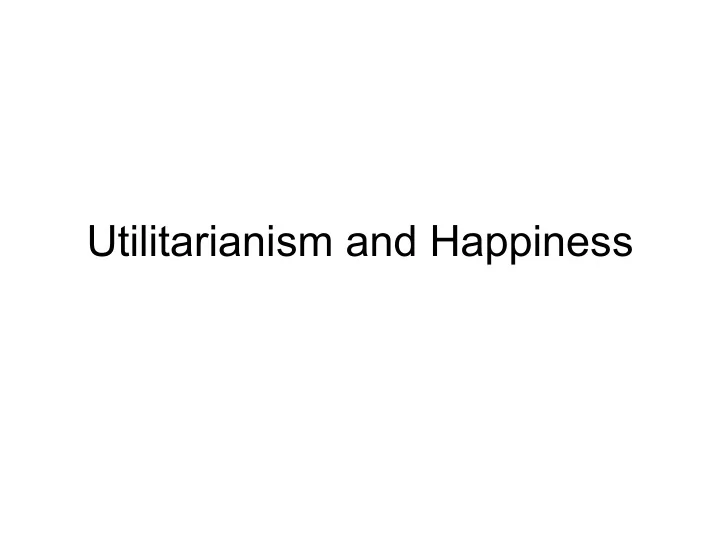

Utilitarianism and Happiness
Brief Introduction to Utilitarianism Utilitarianism says that An action is right if and only if it produces the most happiness of any of the alternatives. Happiness, according to the utilitarian, is experiencing pleasure and not experiencing pain, while unhappiness is experiencing pain and not pleasure. (Note that producing happiness need not be producing it right now , it might be happiness in the long run.) Examples...
Happiness as an end of action Utilitarianism says that happiness is the only thing that is an end, i.e., desirable for its own sake rather than for something else. How do we know that happiness is desirable for its own sake? How do we know that happiness is the only thing desirable for its own sake?
Desirable for its own sake? What does desirable for its own sake mean?
Desirable for its own sake? What does desirable for its own sake mean? It means that we would want it even if it did nothing for us. This is the same as "good without qualification" in Kant's phrase. Kant disagrees with Mill about this. Who is right?
Mill's proof Mill tries to prove (1) that happiness is desirable as an end and (2) that it is the only thing desirable as an end. What is his proof of (1)?
Mill's proof Mill tries to prove (1) that happiness is desirable as an end and (2) that it is the only thing desirable as an end. What is his proof of (1)? See third paragraph, Chapter 4, of Utilitarianism
The only proof capable of being given that an object is visible, is that people actually see it. The only proof that a sound is audible, is that people hear it: and so of the other sources of our experience. In like manner, I apprehend, the sole evidence it is possible to produce that anything is desirable, is that people do actually desire it. If the end which the utilitarian doctrine proposes to itself were not, in theory and in practice, acknowledged to be an end, nothing could ever convince any person that it was so. No reason can be given why the general happiness is desirable, except that each person, so far as he believes it to be attainable, desires his own happiness. (3 par. Ch. 4 Utilitarianism)
Is Mill's argument good? Is Mill's argument convincing?
Is Mill's argument good? Is Mill's argument convincing? It looks like Mill's argument makes a mistake. The only proof that we are able to see something is that we see it. But just be cause we can see it, doesn't mean that it's a good thing to see it! Similarly, the only proof that we are able to desire something is that we desire it. But just because we can desire it, doesn't mean that it's a good thing to desire it!
Is Mill's argument good? There are two meanings of "desirable": 1. "Desirable" sometimes means "able to be desired" 2. "Desirable" sometimes means "worth being desired" Mill's argument only obviously works according to meaning number one. But meaning number two is the important one for moral philosophy.
Is Mill's argument good? There are two meanings of "desirable": 1. "Desirable" sometimes means "able to be desired" 2. "Desirable" sometimes means "worth being desired" Mill's argument only obviously works according to meaning number one. But meaning number two is the important one for moral philosophy. Nevertheless You might think Mill is really on to something. Leave aside the details of his argument: isn't the fact that everyone likes happiness great evidence that there's something valuable, as an end, about happiness?
Mill's second argument about happiness Besides showing that happiness is desirable as an end, Mill also needs to show that it's the only thing desirable as an end.
Mill's second argument about happiness Besides showing that happiness is desirable as an end, Mill also needs to show that it's the only thing desirable as an end. And that looks tricky! Don't we desire many things besides happiness as an end?
Mill's second argument about happiness Besides showing that happiness is desirable as an end, Mill also needs to show that it's the only thing desirable as an end. And that looks tricky! Don't we desire many things besides happiness as an end? Do some people care about... ...Other people, even when that is hard or difficult ...Honesty, even when it brings them no pleasure ...Justice, even when it causes personal hardship ...Respect
Mill's second argument about happiness What does Mill say in response to these cases like other people and justice?
Mill's second argument about happiness What does Mill say in response to these cases like other people and justice? He says that we learn to make these things a part of our happiness, so our happiness cannot be separated from them. As a result, we wish for certain things despite the appearance of difficulty or suffering that they create.
Recommend
More recommend